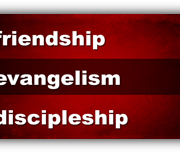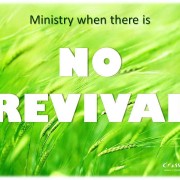Self-perception. Is it ever accurate? Jere 17:9
More than 25 years ago I had a conversation with a senior pastor that provoked my thinking and prodded me to do a completely informal survey with about a dozen other senior pastors that I considered friends. The survey took place over a span of about 5 or 6 years and the fact that all of the senior pastors I spoke with had the same perspective has embedded what I discovered into my mind, never to be forgotten. A few conversations that I’ve had recently, along with some things that I’ve seen written on a few blogs by other senior pastors over the past few months have stirred up one of those discoveries that I made all those years ago.
Although I don’t remember most of the specifics of that original conversation, the point of ignition for my further thinking on the subject was a comment from my friend, the senior pastor, that ended with him making a statement similar to this, “…..I’m not really sure why things unfolded the way they did, but I do know that I’m a ‘people-person’.”
When I heard this brother describe himself that way—as a “people-person”, I was more than a bit surprised. To be sure that I had actually understood what he meant, I asked him to repeat the point that he had just made. And he did so. He was convinced in his own mind that he was a “people-person”. I now knew that he genuinely believed that about himself. He had just given me his honest perception of himself.
Apparently, because of the look on my face at that moment and because we’d always had a very transparent relationship with each other, he told me that he could tell I wasn’t buying what he was saying and he asked me whether I agreed with his description of himself as a “people-person”.
And so, being the personality-type that I am, I told him that although I would describe him to others in many positive ways, his being a “people-person” would never be one of them. And not only that, but I also told him that if I went around to the people who he interacted with on a regular basis and asked them to describe him to me, more than likely, none of them would him as a “people-person” either.
Now it was his turn to be surprised. He asked me if I was serious and I reminded him that he knew better than that. And this is where the conversation got even more interesting.
I then told him that through my experiences in management in the secular world, the graceful honesty of my wife and immediate family members who loved me enough to tell me the truth about myself, and many principles that I had I learned from God’s word since becoming a follower of Jesus, I had learned to exercise extreme caution when it came to trusting that my perception of myself was actually accurate.
I said that I had learned that I if really want to know the type of person I am, the most accurate way to do that is to ask a close friend to go around and do a mini-survey of the 8-10 people that I interact with at least once or more per week. I would give my close friend, the surveyor, very simple instructions. He should ask each of these people individually, to describe ME in five or six different ways using a few words or phrases for each description. And when my close friend gave me the responses, I would accept that these people’s descriptions are more than likely the way that I actually am. Even if those descriptions might not even be close to the way I perceive myself.
At this point, my conversation with my senior pastor friend turned even more interesting. He told me that if those who know him best really wouldn’t describe him as a “people-person” it was either because they hadn’t gotten to know him well enough or because they had expectations of him that he could never live up to.
He really said these things to me.
That conversation ended with me challenging him to consider a few things, including the possibility of having a close friend doing something like the mini-survey that I told him about.
And then, as I said above, over the next few years I asked 5 or 6 other senior pastors some questions based on what I had learned from the original conversation with my senior pastor friend. The questions and a summary of their answers went like this:
1. Do you believe that you’re a “people-person”? (All of them said “yes”)
2. Would those who interact with you on a regular basis describe you as a “people-person”? (Most of them said “yes”)
3. But if someone other than you asked them to describe you to someone else, would they describe you to someone else as a “people-person”?
(All of them said, “probably not”)
4. Whose perception is most accurate, yours or theirs? (All of them said their own perception of themselves was more accurate)
5. If your perception is the accurate one, what is the source of the mis-perception of others? (In one way or another, they all said it wasn’t anything to do with them, it had something to do with the other people)
Although I believe that a fairly reasonable case can be made that a senior pastor should be a “people-person” along with quite a few other character traits, that’s never been what really bothered me. What bothered me then and what has cropped up to bother me again today is the core issue of conflicting perceptions.
When self-perception is contradictory to, or the opposite of the perception of a group of other people who know us and love us, what should be provoked within us?
–Should we throw the burden on others to figure out what we already know about ourselves?
–Or, should we move forward humbly recognizing that our own self-perception hasn’t been accurate and that if we desire to be perceived in a different way, we might need to repent and be willing to change a few things in our own lives, and have those that love us help us make those changes?
And finally, referring to someone as a “people-person” is probably not taking place these days among the age groups under 40. My guess is that rather than describing someone as a “people-person”, this younger group would more than likely describe that type of person as “relational”.
Either way, here’s a brief summary of what a “relational” or “people-person” does:
–Makes you not only feel comfortable in their presence, but makes your being with them so totally enjoyable that you can’t wait to hang out with them again.
–Demonstrates a genuine interest in you that shows itself through the questions they ask, the diligence with which they listen to your responses, and then the next few questions they ask you that are based on your previous answers to the questions they asked you.
–At just the right times, reveals their own thoughts, experiences, struggles, or victories in a way that makes them real to you and gives you confidence that they have a real connection with you.
–Never gives you the impression or the “vibe” that they are spending time with you for any other reason than a sincere desire to know you more so that your relationship with them can deepen and you can be a greater blessing to one another.
–Even when your relationship with them has a “task accomplishing” angle to it, you never feel like if you stopped accomplishing the task for them that they would no longer have an interest in spending time with you or caring about how you’re doing.










